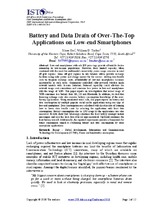Battery and data drain of over-the-top applications on low-end smartphones
Abstract
Low-end smartphones with sub $50 price tags provide affordable device ownership to low-income populations. However, their limited capacity, when combined with the need for multimodal connectivity, raises usage concerns in rural off-grid regions. Some off-grid regions in sub-Saharan Africa provide recharge facilities using solar power and charge money for the service. Adding data bundle costs to frequent recharge costs, affordability of low-end smartphones becomes questionable in such areas. Community-controlled solar-powered wireless mesh network models with Session Initiation Protocol capability could alleviate the network usage cost conundrum and consume less power in low-end smartphones with the usage of WiFi. This paper reports on investigations that reveal usage of WiFi consumes less battery than 3G, 2G and Bluetooth. In addition, we feel that lowering recharge costs also requires battery consumption knowledge of the over-the-top applications. Using automated voice calls, this paper reports on battery and data consumption by multiple popular social media applications using one type of low-end smartphone. Data consumption was calculated with the objective of learning how to lower data bundle costs by selecting the application with least data consumption. Battery consumption due to CPU usage by the applications was also measured. Results show that WhatsApp consumes the least battery amongst instant messengers and also the least data over all apps measured. SipDroid consumes the least battery overall. Additionally, the reported experiments provide a framework for future experiments aimed at evaluating battery and data consumption by other smartphone applications.

